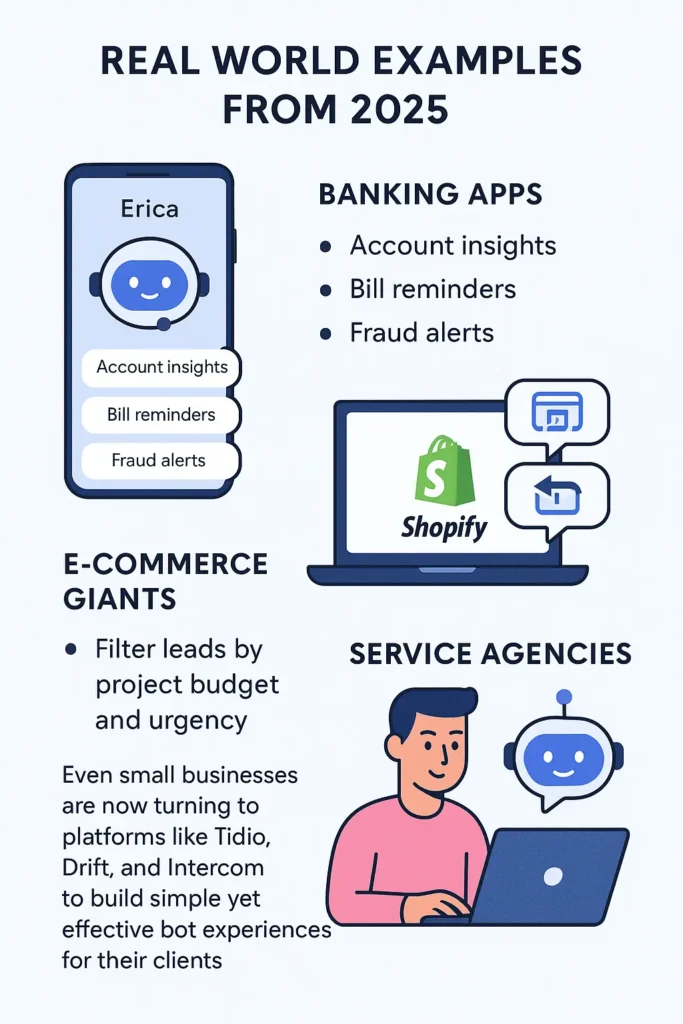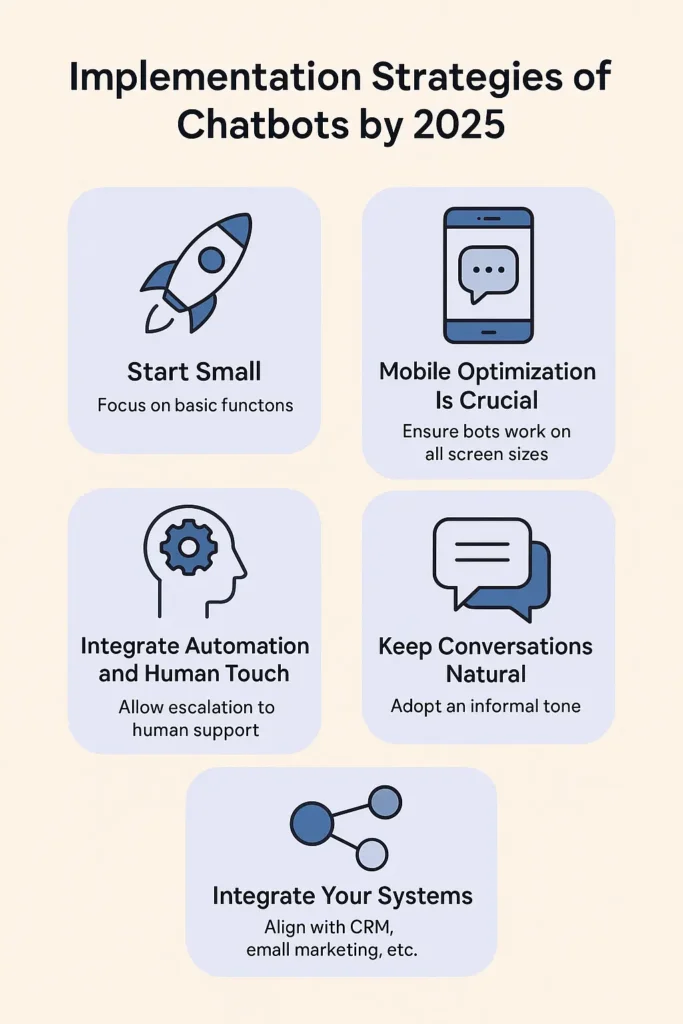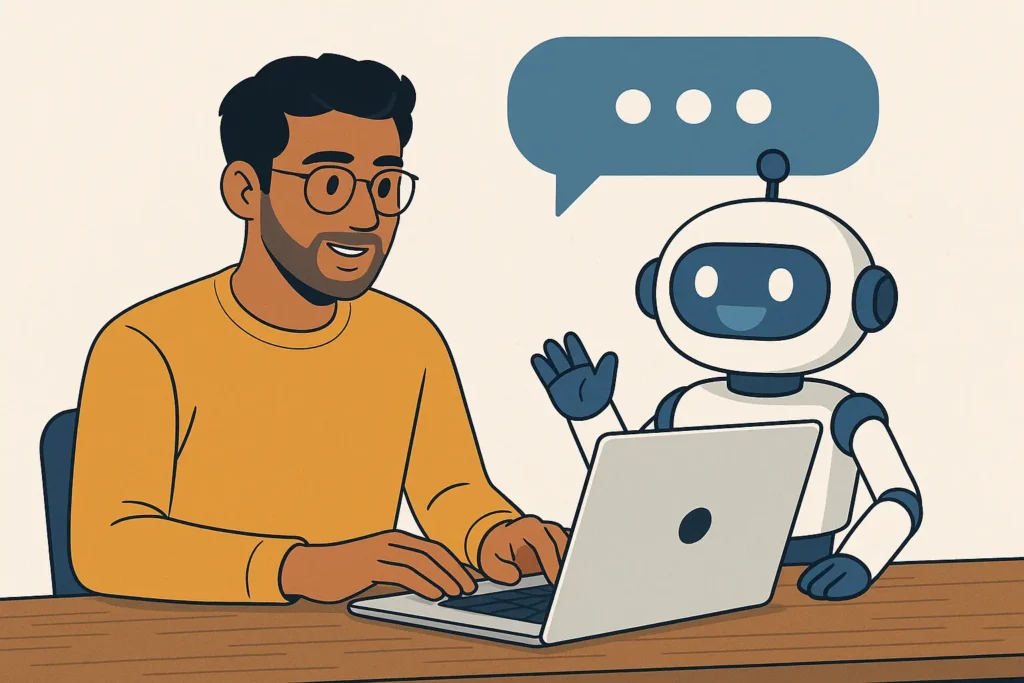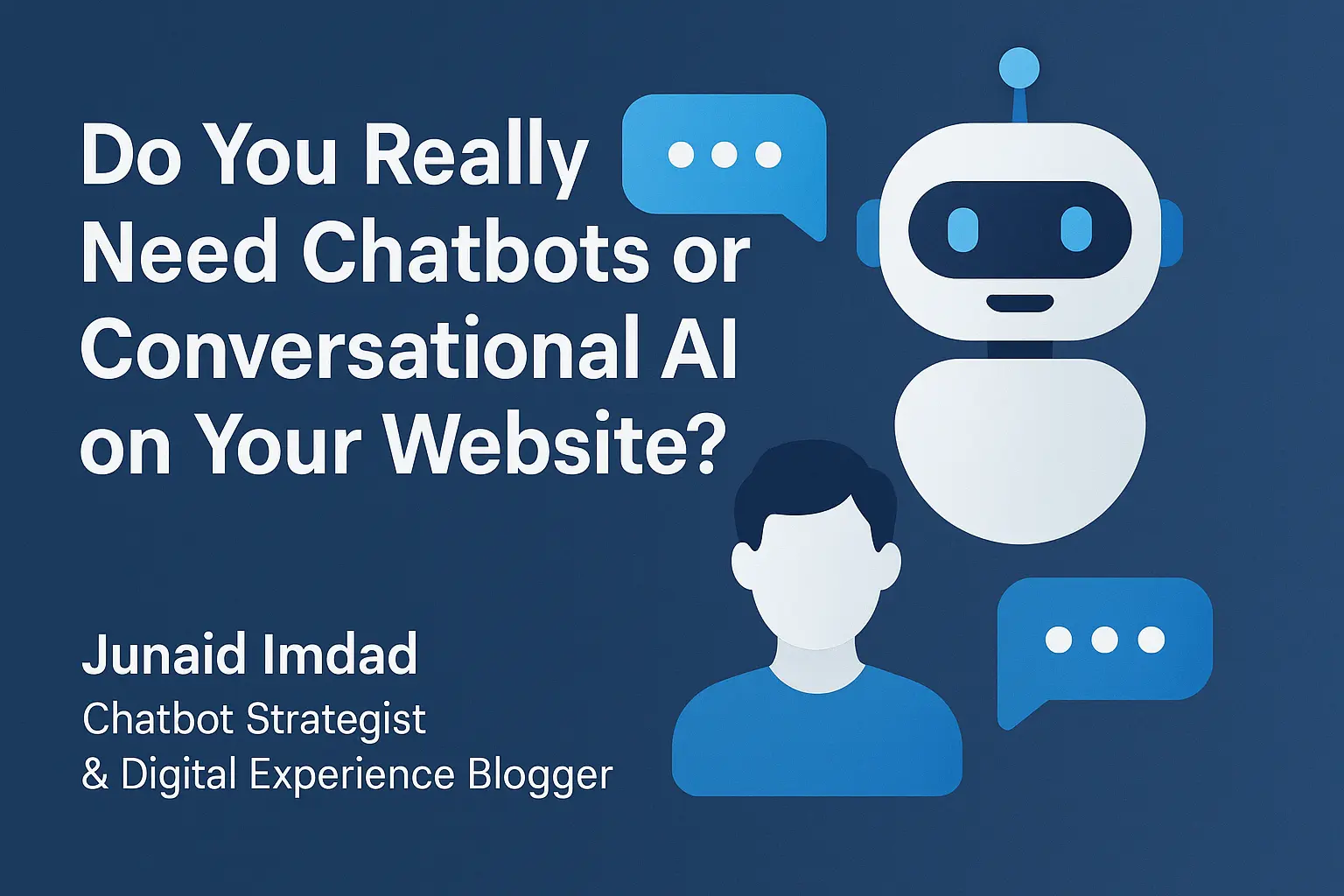By Junaid Imdad, Blogger & Digital Experience Strategist
Have you ever visited a website and been welcomed by a friendly chatbot or conversational AI? If you’ve spent any time online in 2025, the answer is probably yes! Whether it’s a small business, an e-commerce platform, or a big service provider, chatbots have become a staple of the online experience. They’re no longer those clunky, robotic things we used to know—they’re smart, quick, and surprisingly helpful. Chatbots for Websites in 2025 are essentially sophisticated software tools crafted to mimic human conversations.
But for business owners, marketers, and entrepreneurs, one big question remains: Do you really need a chatbot on your website? The answer really hinges on your goals. If you’re looking to lower bounce rates, manage inquiries around the clock, automatically qualify leads, or enhance the overall user experience, then absolutely—adding a chatbot could be a game-changer. In today’s competitive digital world, customers expect instant responses, and chatbots can provide that without piling more work onto your team.
Plus, AI-driven chatbots have come a long way from just basic Q&A scripts. They can now give personalized product suggestions, schedule appointments, escalate issues to human agents, and even gather valuable user data to shape your marketing strategy. So, before you dismiss the idea, take a moment to think about what a chatbot could do for your business—and how it might just become your most dedicated team member.
As a blogger with five years of experience in digital strategy and user experience, I’ve watched chatbots evolve from simple gimmicks into robust AI tools that can do so much more than just respond to basic questions. In 2025, chatbots are changing the way users engage with online platforms. So, let’s dive into what chatbots and conversational AI really are, explore their benefits and downsides, and figure out if your website truly needs one this year.
What Are Chatbots and Conversational AI?
Chatbots have really evolved from the clunky, rule-based systems we used to know. By 2025, they have two options: stick to basic, predefined workflows or harness the incredible capabilities of artificial intelligence to create engaging, dynamic conversations. These AI-driven chatbots have moved beyond just answering frequently asked questions—they’re now grasping user intent, adjusting to various conversation styles, and providing context-aware responses in real time.
The days of frustrating, easily recognizable bots are behind us. Thanks to breakthroughs in natural language processing and machine learning, conversational AI has reached a whole new level of sophistication. We’re now witnessing both text and voice-based bots that can engage in smooth, human-like dialogues. They learn from every interaction, which means they become smarter with each use, offering increasingly relevant and personalized experiences.
Picture a chatbot that doesn’t just inform a user about your store hours but also suggests a product based on their browsing history, assists them with checkout right in the chat, or even sets a follow-up reminder—all without coming off as robotic. That’s the exciting transformation we’re seeing: chatbots evolving into intelligent digital assistants, rather than just being customer service shortcuts.
For businesses, this shift is a fantastic opportunity to build stronger relationships, enhance engagement, and streamline operations. Brands that are integrating conversational AI into their websites are already reaping the rewards: quicker support times, happier customers, and higher conversion rates. In short, AI-powered chatbots are no longer just a nice-to-have—they’re becoming essential for staying competitive.
Chatbots for Websites in 2025
Chatbots for websites in 2025 have transformed from being merely a “nice-to-have” feature to an essential part of the modern digital customer experience. Thanks to rapid advancements in artificial intelligence and natural language processing, today’s chatbots do much more than just handle basic FAQs. They engage visitors in meaningful, real-time conversations, offer personalized product recommendations, help troubleshoot issues, and gather user data to inform future strategies—all while operating around the clock without needing human oversight.
Whether you’re managing an eCommerce store, a service-oriented business, or a SaaS platform, chatbots can significantly enhance user engagement, lower bounce rates, and boost conversion rates. They’ve evolved beyond simple support tools; they now act as virtual brand ambassadors, guiding users through their journey from discovery to decision-making.
What really distinguishes the chatbots of 2025 is their knack for understanding context and intent. With smarter integrations and behavioral targeting, these bots can customize interactions based on user behavior, past interactions, and immediate needs. They can recognize returning customers, adjust their tone and suggestions accordingly, and even escalate conversations to human agents when needed.
In short, chatbots are changing the game for how businesses connect with their audiences—one intelligent conversation at a time. In a world where speed, personalization, and responsiveness are key to success, having an AI-powered chatbot isn’t just an enhancement; it’s a strategic advantage.
Why Are Chatbots Trending in 2025?
Chatbots for websites in 2025 have come a long way from just handling basic customer support. Now, they’re making waves in almost every sector, from retail and healthcare to education. With the help of cutting-edge AI tools like GPT-4 and beyond, businesses can easily roll out incredibly advanced bots. These modern chatbots are capable of:
- Provide 24/7 Customer support
- Manage multiple inquiries simultaneously
- Capture and qualify leads with ease by customizing product or service recommendations
- Help with onboarding or tutorials
At present, users expect instant communication and support–something which chatbots offer quickly and effortlessly.
Pros of Integrating Chatbots on Your Website
Let’s investigate the tangible advantages chatbots and conversational AI bring.
1. 24/7 Customer Support
Chatbots for websites in 2025 have completely redefined what it means to provide round-the-clock support. In a world where people expect instant answers and real-time solutions, sticking to traditional business hours just doesn’t cut it anymore. That’s where the latest chatbots come into play—filling the gaps and making sure that no customer question goes unanswered, no matter the hour or location.
Whether it’s 2 a.m. in Tokyo or lunchtime in New York, today’s chatbots are always ready to engage, assist, and guide users on their journey. This is particularly beneficial for businesses with a global presence or a diverse audience spread across various time zones. These smart bots can handle everything from answering frequently asked questions to processing orders, booking appointments, or escalating more complex issues when necessary.
The outcome? Happier customers, fewer abandoned carts, and a customer service experience that never takes a break—all without the costs associated with a 24/7 human support team.
2. Lead Generation and Qualification
In 2025, a truly effective chatbot is so much more than just a digital assistant—it’s a powerhouse for lead generation. These smart tools can effortlessly gather email addresses, ask insightful qualifying questions to pinpoint high-intent prospects, and guide users through every step of the sales funnel, all without needing a human touch.
By automating this entire process, chatbots enable businesses to capture leads 24/7, sift through unqualified traffic, and make sure that sales teams can focus their efforts where they matter most. Whether it’s scheduling a demo, suggesting the perfect product, or gently nudging a visitor toward checkout, today’s chatbots are essential in boosting conversions while ensuring a smooth, fast, and personalized user experience.
3. Cost Savings
Instead of bringing on a big, expensive support team, savvy businesses in 2025 are embracing advanced chatbots to tackle everyday customer questions. These AI-driven helpers provide round-the-clock support, quickly addressing common queries, sorting out simple problems, and guiding users through tasks like choosing products, making bookings, or troubleshooting—all without needing a human touch. By automating these routine interactions, companies are slashing overhead costs while offering quicker, more reliable service. The outcome? Happier customers, streamlined operations, and more resources available to concentrate on strategic growth.
4. Increased User Engagement
Visitors are much more inclined to interact with your site when they know that help is just a click away. That’s why chatbots have become a must-have for modern websites in 2025. These AI-driven assistants provide real-time support, answering questions and guiding users on the spot, which helps lower bounce rates and keeps visitors on your site for longer. By smoothing out the browsing experience, chatbots are crucial in extending session duration, boosting conversions, and fostering trust with your audience.
5. Personalization
Chatbots for websites in 2025, especially those fueled by cutting-edge conversational AI, are really stepping up the game when it comes to personalization. These clever assistants can effortlessly connect with CRMs, analytics tools, and even browser cookies to gather real-time insights about a visitor’s behavior, preferences, and purchase history. The outcome? Experiences that are so hyper-personalized, they almost feel human. Whether it’s providing customized promotions and product suggestions or recommending relevant content and services, these chatbots are all about crafting a more intuitive and engaging journey for every user—ultimately boosting conversions and fostering stronger customer loyalty.
6. Data Collection and Insights
Chatbots on websites in 2025 have transformed from simple virtual support agents into robust analytics powerhouses. Every time a user interacts with a chatbot, it produces valuable data that reveals deep insights into user behavior, common challenges, frequently asked questions, and points where users tend to drop off in the conversion process. By diving into these conversations, businesses can spot trends, streamline user experiences, enhance their content strategies, and refine their marketing messages. In a digital world where personalization and efficiency are crucial, chatbots are becoming indispensable tools for not just engaging users but also making smarter, data-driven decisions.
What Are the Main Challenges and Limits To Consider in Business Development?
As much as we appreciate all the advantages, it’s only fair to discuss potential downsides as well.
1. Limited Understanding
Chatbots for websites in 2025 that depend only on rule-based logic often find it tough to handle complex questions or subtle conversations. Without the backing of artificial intelligence (AI), these bots can leave users feeling more puzzled than pleased, which really emphasizes the increasing demand for AI-powered conversational experiences.
2. Interpersonal Interactions
While Chatbots for Websites in 2025 powered by conversational AI have made impressive strides, some users still prefer interacting with a real human—especially when it comes to sensitive, emotional, or highly complex issues where empathy and nuance matter most.
3. Upkeep and Training
Chatbots for Websites in 2025, especially those powered by AI, require ongoing updates and training to stay effective. Ensuring quality data input and refining responses demand consistent effort and strategic oversight.
4. Implementation Costs
Implementing advanced bots may be costly for small businesses with tight budgets, particularly when developing them and maintaining them.
If you want to know that how much it will cost to build a new website or mobile app, simply click on the link.
Which Businesses Benefit the Most from Chatbots?
Here are a few industries and website types where chatbots provide significant value:
- E-commerce: Order tracking, product recommendations and checkout assistance services available here.
- SaaS Platforms: Onboarding, Troubleshooting and Feature Guidance
- Healthcare: Appointment booking, FAQs and basic triage (HIPAA-compliant systems only).
- Real Estate: Professional Qualification, Virtual Tours and Property Inquiries.
- Education: Student FAQs, course recommendations and admissions support
Real World Examples from 2025
- Banking Apps: Artificial intelligence bots such as Erica from Bank of America can provide account insights, bill reminders and fraud alerts.
- E-commerce Giants: Shopify stores use bots to assist in product discovery and facilitate returns.
- Service Agencies: Marketing and design firms utilize chatbots to efficiently filter leads by project budget and urgency.
Even small businesses are now turning to platforms like Tidio, Drift and Intercom to build simple yet effective bot experiences for their clients.

How Can YOU Decide: Do YOU Really Require a Chatbot?
Ask yourself these questions:
- Are you receiving high volumes of repetitive queries?
- Are your support team members overwhelmed or unavailable after hours?
- Are your visitors needing assistance navigating your site or products?
- Are your leads suffering due to slow response times?
- Do you wish to generate more actionable data from user interactions?
If any of the questions above sounded familiar, a chatbot could be an invaluable asset in your arsenal.
Implementation Strategies of Chatbots by 2025
- Start Small: To ensure the best start possible, focus on providing basic functions first before expanding upon them.
- Integrate Automation and Human Touch: Allow users to escalate to human support when needed.
- Keep Conversations Natural: To foster natural conversations, adopt an informal tone instead of robotic language.
- Mobile Optimization Is Crucial: Make sure bots work perfectly across all screen sizes.
- Integrate Your Systems: Align with your CRM, email marketing and analytics tools for seamless operation.

Conversational AI Will Dominate Future Markets
Conversational AI is set to become a key player in digital experiences by 2025. With remarkable strides in natural language processing (NLP), emotion recognition, and predictive analytics, chatbots have moved beyond just offering scripted responses or basic help. They’re transforming into smart digital assistants that can grasp tone, user sentiment, intent, and context in real-time. This shift means that by 2025, chatbots on websites will do more than just answer questions; they’ll guide users through personalized experiences—whether that’s assisting with a purchase, suggesting products, or delivering customized content based on what users have browsed.
The real magic of these next-gen bots is their ability to learn and adapt from every interaction, tuning into individual preferences and anticipating user needs even before they’re expressed. Consequently, businesses that embrace AI-driven chatbots for their websites in 2025 can expect to see happier users, higher retention rates, and a smoother customer journey—all while cutting down on support costs and reducing manual tasks.
If you want to get info about UI/UX design trends, simply click on it.
Soon, we’ll witness emotion-aware bots that adapt their tone accordingly.
Multilingual support with real-time translation
Integration with voice search and smart assistants
Bots can book meetings, send reminders and even purchase goods and services on your behalf.

Conclusions and Considerations: The Verdict
Are you considering adding a chatbot or conversational AI to your website?
If your business prioritizes instant support, lead generation, user engagement, and long-term growth, then bringing a chatbot on board is definitely something to think about.
But here’s the thing: just like any digital tool, the success of a chatbot hinges on how well it’s planned and executed. Start by selecting the right platform—one that fits your goals and works seamlessly with your current tech setup. Clearly define what you want the chatbot to achieve, whether that’s qualifying leads, answering frequently asked questions, or boosting sales. And don’t forget to treat it as a dynamic tool: collect real user feedback, analyze performance metrics, and keep fine-tuning its responses to better meet your audience’s needs over time.
When done right, a chatbot doesn’t just assist your business—it becomes an essential part of your growth strategy.
Chatbots aren’t just the latest trend; they could be the smartest addition to your digital team.
Need assistance in developing or rolling out your chatbot strategy? Get in touch, and let’s work together to create a plan that perfectly aligns with your brand’s voice and audience needs.
By Junaid Imdad, Blogger & Digital Experience Strategist




Cybersecurity in Web Development: 2025 Threats and How to Protect Your Site - Devitcity
[…] you want to know about chatbots on your site, simply click on […]
2025's UI/UX Trends: What's Hot in Web and App Design - Devitcity
[…] Do You Really Require Chatbots or Conversational AI on Your Website? – Devitcity […]